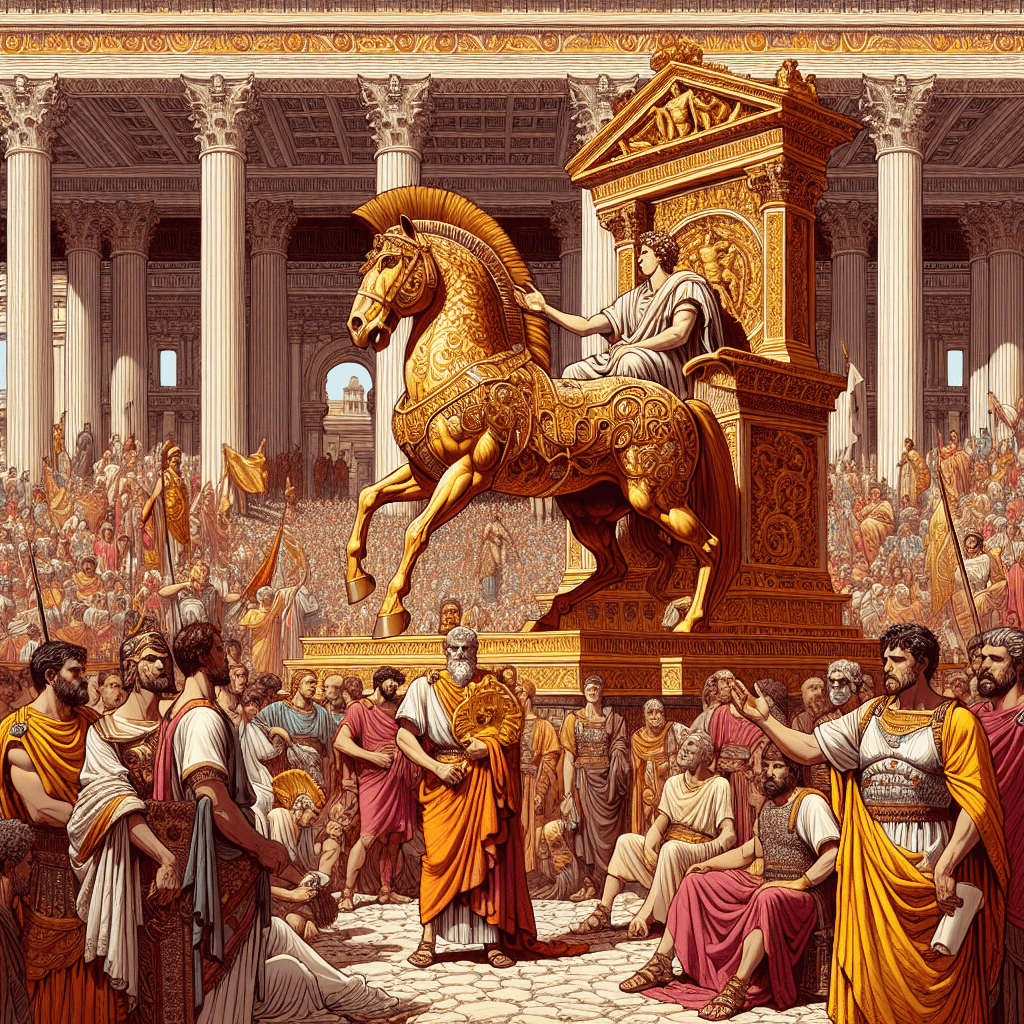From Stable to Senate: The Legend of the Horse Consul
In a legendary act of madness or political satire, one Roman emperor decided his beloved horse was more fit to rule than the men of the Senate. This is the story of Incitatus, the steed who was granted a marble stable, a jewel-encrusted collar, and a nomination for the highest office in the Empire.


Too Long; Didn't Read
Roman Emperor Caligula famously planned to make his horse, Incitatus, a consul. This was likely less about insanity and more a political stunt to mock the Roman Senate, showing that their positions had become meaningless under his absolute power.
Hooves in the Senate? Is it True a Roman Emperor Appointed His Horse as Consul?
The annals of Roman history are filled with tales of grandeur, conquest, and, at times, baffling eccentricity. Perhaps one of the most enduring and bizarre stories is that of an emperor who supposedly valued his horse so highly that he planned to elevate it to one of the highest offices in the Roman Republic: a consul. But is there any truth to this almost unbelievable claim? Did a horse truly hold such a prestigious political position in ancient Rome? This blog post will delve into the historical accounts, separate fact from embellishment, and explore the intriguing story of Emperor Caligula and his beloved steed, Incitatus.
The Emperor and His Cherished Steed
The emperor at the heart of this tale is Gaius Caesar Augustus Germanicus, more commonly known by his childhood nickname, Caligula. He reigned from 37 to 41 AD, and his rule is often depicted as one marked by cruelty, extravagance, and alleged madness. While some modern historians suggest his negative portrayal might be exaggerated by hostile sources, the image of a tyrannical Caligula has persisted.
Central to our story is Incitatus, Caligula's favorite horse. According to ancient writers, Incitatus lived a life of unparalleled luxury. Historical sources like Suetonius, in his "Lives of the Twelve Caesars," describe Incitatus as having:
- A marble stall
- An ivory manger
- Purple blankets (a color reserved for royalty and high status)
- A collar of precious stones
- Even a house, complete with servants and furniture, to entertain invited guests in the horse's name.
Caligula reportedly doted on Incitatus, demanding silence in the neighborhood the night before races to ensure the horse wasn't disturbed.
The Consulship Claim: Did Incitatus Really Hold Office?
This is where the story takes its most famous turn. The primary sources for this claim are Roman historians Suetonius (writing about 80 years after Caligula's death) and Cassius Dio (writing nearly two centuries later).
According to Suetonius, Caligula "planned to make him [Incitatus] consul." Cassius Dio's account is similar, stating that Caligula "promised to appoint [Incitatus] a consul." It's crucial to note the language used: "planned" and "promised." Neither historian definitively states that Incitatus actually served as consul. They report Caligula's intention or declaration to do so.
There is no contemporary evidence, such as official records or inscriptions, to suggest Incitatus was ever formally appointed or held the office of consul. The consulship was a highly significant position, even under the emperors, and such an appointment would likely have been recorded if it had officially occurred.
Decoding Caligula's Intent: Madness, Mockery, or Message?
If Incitatus was never formally a consul, why did Caligula make such a claim, and why has the story persisted? Historians offer several interpretations:
- A Sign of Madness: Some take the story at face value, seeing it as evidence of Caligula's supposed insanity and his detachment from Roman tradition and propriety.
- A Calculated Insult: Many scholars believe Caligula's statement was a deliberate act of contempt towards the Senate and the Roman elite. By suggesting his horse could perform the duties of a consul, he was arguably mocking the senators, implying they were no more capable or important than his steed. This would have been a powerful, albeit outrageous, way to demonstrate his absolute power and disdain for the traditional ruling class.
- Political Satire: It could have been a form of dark, satirical commentary on the diminished role of consuls under the imperial system. If the emperor held all real power, the actual individuals serving as consuls were largely ceremonial, so why not a horse?
- An Empty Threat: Caligula might have simply made the pronouncement to shock and intimidate, with no serious intention of carrying it through.
The accounts by Suetonius and Cassius Dio were written decades, even centuries, after Caligula's assassination. These historians often wrote with a moralizing tone and sometimes included sensational stories to highlight an emperor's flaws, particularly those emperors who had a poor relationship with the Senate.
The Enduring Legend of the Horse Consul
While the historical consensus is that Incitatus was never actually appointed consul, the story of Caligula's intention has endured for millennia. It serves as a potent symbol of tyranny, eccentricity, and the perceived absurdities of absolute power. The tale has cemented Caligula's reputation as one of Rome's most infamous emperors. The lack of definitive appointment doesn't diminish the shock value or the insight the story provides into Caligula's character and his tumultuous relationship with the Roman aristocracy.
In conclusion, the claim that a Roman emperor appointed his horse as a consul is largely an exaggeration of historical accounts. While Emperor Caligula lavished extraordinary attention on his horse Incitatus and reportedly declared his intention to make him a consul, there is no reliable evidence that this appointment ever officially took place. The story is more likely a reflection of Caligula's desire to mock and demean the Senate, a display of his autocratic power, or perhaps a tale embellished by later historians keen to portray him negatively. Regardless of its literal truth, the legend of Incitatus the "horse consul" continues to fascinate, reminding us of the dramatic and often bizarre nature of Roman imperial politics.


